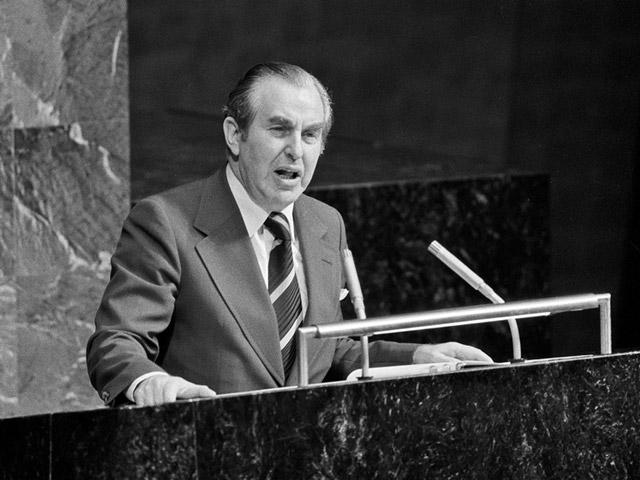On November 10, 1975, a significant event took place at the United Nations that would have far-reaching implications for the perception of Zionism and Israel on the international stage. The United Nations passed U.N. Resolution 3379, a resolution that controversially defined Zionism as a form of racism and racial discrimination. This resolution passed with a vote of 72 in favor, 35 against, and 32 abstentions.
The origins of this resolution can be traced back to the 1960s during the debate in the United Nations leading up to the passage of the International Convention on the Elimination of All Forms of Racial Discrimination. In 1965, the Convention was published and went into effect in 1969. During the debate over this Convention, the United States and Brazil sought to include a clause denouncing anti-Semitism.
I told the Congress: “The UN misrepresents basic facts, falsely accusing Israel of bombing a hospital when it was Islamic Jihad; falsely terms Israel’s legitimate self-defence as ‘collective punishment’; and creates a false moral equivalence between self-defence and terrorism.” https://t.co/A119XL1G80 pic.twitter.com/GrkbJVaNVd
— Hillel Neuer (@HillelNeuer) November 9, 2023
However, the Soviet Union, concerned that such a clause might be used to criticize their persecution of Soviet Jewry, introduced a counterproposal. This counterproposal aimed to condemn not only anti-Semitism but also Zionism, Nazism, neo-Nazism, and all other forms of colonialism, national and race hatred, and exclusiveness. Ultimately, neither clause was included in the Convention. Still, the notion that Zionism should be equated with racism gained traction, and it would come to a head with Resolution 3379.
The passing of this resolution was a significant blow to Israel and the Zionist movement. It was supported by Arab, Muslim, and Eastern European Block states. The backdrop of this development was Israel's victory in the June 1967 Six-Day War, which had strengthened the resolve of the USSR and its Arab allies to challenge Israel politically. They engaged in propaganda campaigns that equated Israel with the Nazis and compared Israeli policies to the apartheid practices of South Africa.
Throughout the early 1970s, both the Palestinians and the Soviet Union increasingly framed the Palestinian opposition to Israel as part of the broader struggle against European imperialism, aligning it with nationalist movements in other nations, particularly in Africa.
In 1974, the Party Central Committee of the Soviet Union formulated a seven-point plan to intensify anti-Zionist propaganda, aimed at fostering patriotic sentiments among the youth of the nation.
The passage of U.N. Resolution 3379 in November 1975 was met with strong opposition from the United States. American Ambassador to the United Nations, Daniel Patrick Moynihan, vehemently addressed the U.N., stating, "The United States rises to declare before the General Assembly of the United Nations, and before the world, that it does not acknowledge, it will not abide by, it will never acquiesce in this infamous act… The lie is that Zionism is a form of racism. The overwhelmingly clear truth is that it is not."
“The situation is insupportable.
— United Nations (@UN) November 9, 2023
To allow it to continue would be a travesty.”
At Thursday’s humanitarian conference on Gaza, @UNReliefChief reiterated the need for a humanitarian ceasefire, urging greater protection for displaced civilians. https://t.co/v3Gl6V6Fa9
Fortunately, the resolution was revoked in December 1991, thanks in part to Israel's insistence on its revocation as a condition for its participation in the Madrid Peace Conference. This marked a significant victory for those who believed in the right of the Jewish people to their homeland in Israel, including Judea and Samaria.


